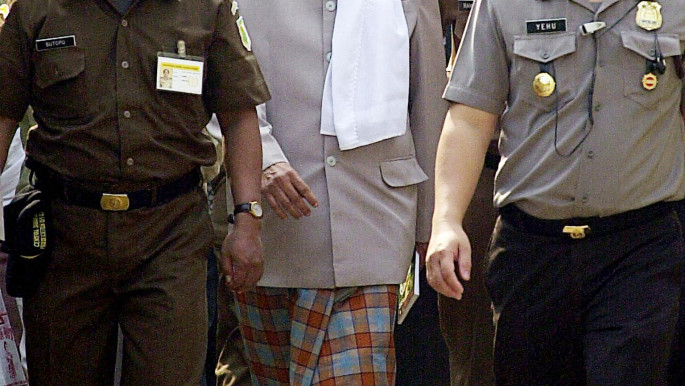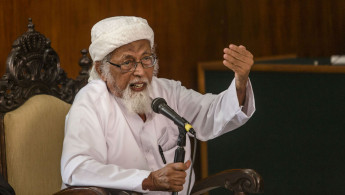Indonesia backtracks on release of Bali bombing-linked cleric
Indonesia's president on Tuesday backed down from a decision to grant unconditional release to an elderly radical Islamic cleric who inspired the Bali bombers and other extremists.
President Joko Widodo announced that 80-year-old Abu Bakar Baasyir won't be released from prison unless he renounces radicalism and pledges loyalty to the state and national ideology.
Baasyir, however, insists he is only answerable to God and that Indonesia should be governed by Islamic law.
"Abu Bakar Baasyir is already old and his health is also deteriorating. You can imagine if we as children see our parents sick," Widodo told reporters.
"However, we also have a legal system here. There are legal mechanisms that we must go through. This is parole, not pure release, but conditional release, so the conditions must be fulfilled first," he added.
Political move?
Indonesia's government had on Friday decided to grant Baasyir release on humanitarian grounds.
Critics blasted the decision as an attempt to pander to hardline Islamists, amid an ongoing presidential election campaign in which Widodo's opponents have questioned his committment to Islam.
 |
|
| Abu Bakar Ba'asyir [C] is believed to have been the spiritual leader of the 2002 Bali bombers [AFP] |
Baasyir, who was previously considered the spiritual leader of al-Qaeda-linked militant group Jemaah Islamiyah, has long denied accusations of extremism levelled against him.
He was arrested almost immediately after the 2002 Bali bombings, in which 202 people were killed.
Prosecutors, however, were unable to prove a string of terrorism-related allegations made against the cleric. He was instead sentenced to 18 months in prison for immigration violations.
Baasyir was jailed again in 2011, when he was sentenced to 15 years in prison for supporting a military-style training camp for Islamic militants. The octogonarian - who is an Indonesian of Hadrami Yemeni descent - also founded an Islamic boarding school in the Javanese city of Solo that terrorism experts regarded as a factory for violent extremists.
Alliegance to the Islamic State group
While incarcerated in 2014, the firebrand cleric pledged alleigance to the Islamic State group.
"His decision to pledge baiat (alleigance) to Abu Bakr al-Baghdadi in 2014 led to a large defection. I think it's really important to understand how important patron-client ties are in Southeast Asia; so if a esteemed figure does something, his network will broadly follow suit," Dr Zachary Abuza, a professor at the National War College and specialist on security in Southeast Asia, told The New Arab.
Attacks carried out by the IS group in Southeast Asia, including the 2016 Jakarta bombings, have underlined a growing threat posed by the group in the region. Security forces have so far, however, been able to contain the threat posed by the militant group amid increasing propaganda efforts by their supporters.
"They [IS] are not a mass organisation, by definition. But it doesn't take many motivated and highly radicalised individuals to create havoc or force the state to over-react. The government has done a good job in mitigating the threat and Indonesia has great social resiliency against IS' ideology. But it is not going to simply go away," Abuza said.





 Follow the Middle East's top stories in English at The New Arab on Google News
Follow the Middle East's top stories in English at The New Arab on Google News
![The UAE is widely suspected of arming the RSF militia [Getty]](/sites/default/files/styles/image_330x185/public/2024-11/GettyImages-472529908.jpg?h=69f2b9d0&itok=Yauw3YTG)
![Netanyahu furiously denounced the ICC [Getty]](/sites/default/files/styles/image_330x185/public/2024-11/GettyImages-2169352575.jpg?h=199d8c1f&itok=-vRiruf5)
![Both Hamas and the Palestinian Authority welcomed the ICC arrest warrants [Getty]](/sites/default/files/styles/image_330x185/public/2024-11/GettyImages-2178351173.jpg?h=199d8c1f&itok=TV858iVg)